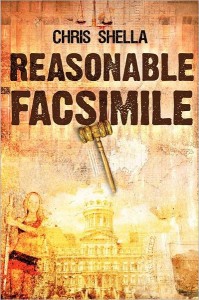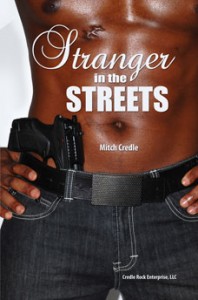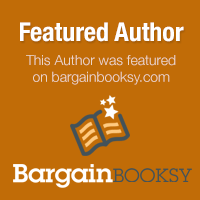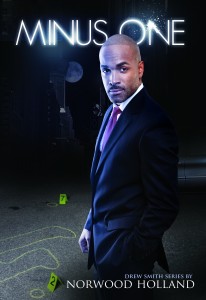Self-Publishing Services – Prix Fixe or À La Carte
February 10, 2012
![]() I’m neither fan of Print On Demand nor Self-Publishing companies, but prefer a more hands-on approach. To be fair I’ll address each. It comes down to cost and control. Personally I believe such entities are more interested in profiting and promoting their interest over the author’s often leaving many aspirants at a loss and bitter. Self-publishing is a business and everything you do to print and promote your book comes at a cost. Your goals should be to maximize your position and profit. Self-publishing companies and P.O.D. compete at cross purposes with writers. I find greater value and self satisfaction in the do it yourself route starting from scratch to finish, moreover you pay for what you get.
I’m neither fan of Print On Demand nor Self-Publishing companies, but prefer a more hands-on approach. To be fair I’ll address each. It comes down to cost and control. Personally I believe such entities are more interested in profiting and promoting their interest over the author’s often leaving many aspirants at a loss and bitter. Self-publishing is a business and everything you do to print and promote your book comes at a cost. Your goals should be to maximize your position and profit. Self-publishing companies and P.O.D. compete at cross purposes with writers. I find greater value and self satisfaction in the do it yourself route starting from scratch to finish, moreover you pay for what you get.
When I set out to self-publish with an eye on costs, exploiting publishing rights, and the bottom line I determined P.O.D. wasn’t for me. Wikipedia gives a concise explanation of the P.O.D. business model explaining it as a printing technology and business process in which new copies of a book (or other document) are not printed until an order has been received (which means books can be printed one at a time). While the unit price of each physical copy printed is higher than with offset printing, the average cost is lower for very small print runs, because setup costs are much higher for offset printing.
P.O.D. has other business benefits besides lower costs (for small runs):
- Technical set-up is usually quicker than for offset printing.
- Large inventories of a book or print material do not need to be kept in stock, reducing storage, handling costs, and inventory accounting costs.
- There is little or no waste from unsold products.
These advantages reduce the risks associated with publishing books and prints and can lead to increased choice for consumers. However, the reduced risks for the publisher can also mean that quality control is less rigorous than usual. Some P.O.D. Players are focused on serving this author segment. Their offerings are tailored to disintermediate classic publishers (à la Penguin, McGraw Hill). For authors who wish to design and promote their work themselves, P.O.D. companies focus on the low-service and low-cost. For authors, the potential benefits of P.O.D. publishing are several. They include editorial independence, speed to market, ability to revise content, and greater share of royalties kept compared with traditional publishing. Science Fiction and Fantasy Writers of America takes a more comprehensive view on the pros and cons of P.O.D. citing three considerations:
- Control. With true self-publishing, the writer controls all aspects of the publishing process, from cover art to print style to pricing. With P.O.D. services, choice is typically limited to the package of services the publisher offers.
- Revenue. With true self-publishing, the writer keeps all proceeds from sales. With P.O.D. services, the service keeps the lion’s share of sales proceeds to offset printing costs, and pays the author a percentage–either a percentage of income (a royalty) or a percentage of profit. Basically, you’re paying twice: once upfront, and once with each book produced and sold.
- Rights. With true self-publishing, all rights remain with the writer, who has full ownership of his/her books, including the ISBN number. With most P.O.D. services, the P.O.D. service owns the ISBN, and has a limited claim on digital and/or electronic publishing rights.
Self-Publishing companies are often distinguished from vanity publishing, and here again, it goes to the issue of control. A common complaint among authors using self publishing services is the loss of first rights, copyrights, cover design rights and subsidiary rights. What writer wants to launch a career locked in a contract dispute? And why pay another to rip you off? If you’re going to use a self-publishing service please do your research, some are better than others. Mark Levine’s The Fine Print of Self-Publishing introduces 45 Self-Publishing services analyzing each with their ranking in the industry. The idea of a DIY service strikes me as oxymoronic when you’re paying a service to do all the footwork. Filing copyright registration, ordering ISBN numbers and UPC barcode, selecting a graphic artist or cover and book designer as well as choosing a marketing and promotion strategy are some of the fee for services offered. Not every self publishing story is a success story but it pays to step into this business with you eyes wide open. The obstacles to going it alone can be herculean, but you do have the freedom to judiciously and economically contract out some of those tasks. Sometimes an à la carte menu is better than prix fixe.
Self-Publisher: To Be or Not To Be
February 3, 2012
Self-publishers, also known as independent publishers have leveled the playing field. The day of the joint media/publishing conglomerates with their teams of agents and editors singularly controlling publishing success is over. The internet with a certain ease now allows writers to publish, promote. and sell their books directly to the public. That’s not to say there are no disadvantages to self-publishing. There is the stigma perpetuated by traditional publishing interests aided by ignorant and careless authors.
Author Gloria Mallette in the February 2012 Writer’s Magazine tells of her self-publishing success after years of rejection. She self-published Shades of Jade, and sold 13,000 copies in 2001. Random House noticed her success and wanting a piece of the action reached out while she was feeling overwhelmed with the time consuming self-publishing process. When asked about the change back to self-publishing she explained after publishing 2 books with Random House and 4 books with Kensington Books she returned to self-publishing because Kensington wanted her to write erotica which she refused to do.
There are numerous best seller success stories. Among the advantages of independent publishing control is ranked as number one. Many prefer total control and time becomes a factor while a traditional publishing contract may take anywhere from 18-24 months before the title is in print. The question is whether you’re willing to take on that responsibility specifically the costs. A self publisher is responsible for all cost related to production and promotion, and there are no substantial advances commonly offered by traditional publishing houses. But the good thing is you don’t have to worry about not earning out your advance or being dropped without an option for another book. Incidentally 70-80% of traditionally published authors fail to earn out their advance. An independent publisher controls his own royalties, properties, and operating costs.
Beware, the greatest pitfall is the loss of objectivity. It is absolutely imperative the outside publisher seek outside editorial and business advice. This can often be provided through a self publishing company or the self reliant may prefer to seek out their own team of professional consultants for expert advice on editing, book design, promotional and legal matters. Three reference guides helped me through the process: Peter Bowerman’s The Well-Fed Self-Publisher, How to Turn One Book into a Full-Time Living, and Marilyn Ross’s The Complete Guide to Self-Publishing.
Make no mistake about it, publishing is a business and you would do well to appreciate it as such. There is a lot to learn, marketing, publicity, technology, legal and industry regulations. A professional writer is a very small business of one person; a solo trader in literary ideas. Those who are not businesslike are unlikely to survive. Competition in the market is stiff and your product should be of the highest quality. The learning curb is steep, but you don’t have to go it alone. A great deal of support can be found throughout the industry. National associations like the Indpendent Book Publishers Association and the regional Mid-Atlantic Independent Publishers Association offer marketing support and educational resources.
If you would rather just write and not be bothered with business details then by all means continue writing and querying agents sooner or later you’ll get that break. It will more likely be later, the ebook and internet have upended traditional publishing with increased competition and publishers are less likely to gamble on new writers unable to prove their profitability and ability to garner a readership. Alternatively, if you want to write and run your own business you’ll no doubt embrace the challenges of self publishing. So roll up your sleeves, there’s work to be done.
Writing The Book Proposal
January 27, 2012
A book proposal is multi-purpose but more necessary for non-fiction while an outline may adequately serve the fiction writer’s planning purpose. The proposal keeps the writer focused on the end game i.e., selling books. The greatest benefit is allowing the author to shop it around without a final manuscript. It eliminates the need to write the entire manuscript before you make the sale; indeed, most professional writers, and most beginners as well, use a book proposal to close the deal. Writing a book proposal is often an eye opening experience allowing your creativity to expand and explore possibilities in structuring and organizing the book.
You must submit a book proposal (usually via a literary agent) to procure a book deal. The reason is that the publisher needs to know if investing the money in publishing your book will pay off. Your book proposal must make a compelling case that this book, written by you, is needed in the marketplace.
A good reference is literary agent Michael Larsen‘s How To Write A Book Proposal. He sets out the hot buttons that will excite editors and agents like good writing, the size of the market you plan to penetrate and your ability to promote the book. Like a road map the proposal components serve as milestones along the journey to your publishing destination. It’s a great way to gel you thinking on the marketing viability of your book. Remember you want to write a book people will want to read, and your book proposal is going to show that editor/agent how you plan to do it.
How will it sell? You’ll have to pitch your proposal and it should have a curiosity factor or what Larsen calls “hot buttons” that pique an agents curiosity. For the nonfiction book the proposal helps define the market and the targeted reader, likewise a fiction outline should address the genre and the targeted reader. Every genre has certain specific rules for example a thriller cannot be a thriller without gripping suspense. Knowing the rules and determining market and genre factors are indispensable considerations in planning your book.
The non-fiction author should have a platform or at least begin to build one. A platform speaks to an author’s credentials and what qualifies him or her to speak with any kind of authority on the topic. Literary Agent Rachelle Gardner in her 10 Tidbits About Author Platform suggests a platform is only necessary if you want to sell a lot of books, and not necessary if your primary goal is to write rather than sell. I agree particularly when it comes to the fiction author where an author’s qualifications are more likely measured by the quality of the writer’s writing. Non-fiction authors, be aware the platform is a primary consideration for publishers, and should be primary for you even if you’re considering self-publishing.
Platform building can include: building a speaking career and speaking to larger and larger audiences; having regular or ongoing visibility in the traditional media (radio, TV, magazines, newspapers); having a highly visible position in a large organization, for example, being a pastor of a 5,000 member church or the CEO of a 1,000-employee company; or building a strong online identity with blogging and social networking.
Author William Cain explains the book proposal components with this table of contents example.
- Overview
- Marketing
- Promotion
- Competing Books
- About the Author
- List of Chapters
- Chapter-by-Chapter Summaries
- Sample Chapters
So you say you want to write a book, for non-fiction start with a proposal. If its fiction learn the elements of your genre and conform your outline thereto. Every genre has common specific elements be it Literary, Mystery, Thriller, Romance, Science Fiction, Fantasy and all other contemporary popular genres. In setting out on your journey to write that book let the foregoing be your food for thought.
Next: Self Publisher: To Be or Not To Be
A Review of Reasonable Facsimile by Chris Shella
January 19, 2012
 Chris Shella’s Reasonable Facsimile is a tale of woe and redemption. Jasper Davis, a.k.a. J.D.–or Jack Daniels nicknamed in honor of his favored libation– is a dynamic skilled defense attorney with lots of baggage battling demons alcohol and sex. J.D. is as dirty as the clients he represents seemingly familiar with all low life Baltimore. When court is in recess other lawyers bone up on their cases while Jack Daniels is boning up on lap dances. One wonders how he even manages to function given the excesses of his hedonistic lifestyle, but it serves to fill the void in his life, his absent wife and son. Infidelity caused his wife a college professor to kick him to the curb. There he flounders in the gutter for 7 years. He pines over the past longing to return to the days before daily habits overtook his desire to be a father and husband.
Chris Shella’s Reasonable Facsimile is a tale of woe and redemption. Jasper Davis, a.k.a. J.D.–or Jack Daniels nicknamed in honor of his favored libation– is a dynamic skilled defense attorney with lots of baggage battling demons alcohol and sex. J.D. is as dirty as the clients he represents seemingly familiar with all low life Baltimore. When court is in recess other lawyers bone up on their cases while Jack Daniels is boning up on lap dances. One wonders how he even manages to function given the excesses of his hedonistic lifestyle, but it serves to fill the void in his life, his absent wife and son. Infidelity caused his wife a college professor to kick him to the curb. There he flounders in the gutter for 7 years. He pines over the past longing to return to the days before daily habits overtook his desire to be a father and husband.
J.D. takes on a major violent first-degree murder case and finds himself challenged by the judge, the prosecutor, the witnesses, his addictions, and a sinking reputation all of which get the best of him. But a turning point comes when federal agents suspect he conspired with his client to kill the key witness, a government informant. J.D. has a come to Jesus conversion realizing its life or death and the only way to save his self is to get back home with his wife and child. To complicate it all Carmen an attorney from his past appears and wants to take on the task of salvaging his life.
Reasonable Facsimile is at times humorous and shocking. The characters seem real and familiar. Chris Shella makes effective use of the stream of consciousness technique taking the reader on a tour witnessing through Jasper’s eyes the drunken binges and hangovers, the strip joints, and courtroom drama rich with the minutia of lawyering and legal procedures.
Reasonable Facsimile is a great read despite some editorial weakness. I was disappointed expecting a legal thriller as one reviewer mistakenly touted. That sub-genre usually features an attorney or judge as the hero, caught up in a gripping courtroom drama with numerous plot twists. A legal thriller it is not, but rather a story of the redemptive self transforming suffering into a positive emotional state moving from pain and peril to redemption. Despicable Jasper Davis is transformed from the ignoble to the noble and admirable. With structural flaws Reasonable Facsimile is not a page turner. Nevertheless it is a fulfilling read. I hope for more from Attorney Shella and with the right developmental editing he should have no problem knocking a real legal thriller out of the park.
A Review of Strangers in the Streets by Mitch Credle
December 29, 2011
Credle takes the writer’s adage “write what you know” to heart, leading the reader on a journey into the heads and hearts of vulnerable young men born into an environment where they are groomed and nurtured in the street life. Love plays a pivotal role and a redeeming force in both their lives. A determined father succeeds in removing Smokey from the ghetto life while Black hardened by time served returns to his uncle’s drug dealing enterprise. He resumes the street life killing and robbing until he falls in love with April, a good woman. Love gives Black’s life purpose but at this point it’s too late. The master of his fate not even April’s nor Smokey’s brotherly love can save him.
Strangers in the Streets is a good read despite eschewing the standard dialog format it nevertheless flows. Few writers are able to capture the depth, breadth and reality of street life as experienced by the young African American male with its distinct language and code of conduct. Mitch Credle does it well because he’s been there growing up on the streets of D.C. and rising up to a Homicide Detective with the Metropolitan Police Department.
Strangers in the Streets is a suspenseful read with actual empathy for the villain Ricky Walker otherwise known as Black. The book leaves the reader a sense of hope. Indeed, there is hope for the young men imprisoned and those queuing up to take their place. That hope can only be manifested by changing the environmental forces that shape their lives.
It is said, men are the products of their environments, some rise above it, many do not. It’s certain by changing their bleak environment we can raise the hopes of many.


 DC Homicide Detective Mitch Credle’s novel Strangers in the Street is one gritty real read, a journey into reality chocked with thugs, gangsters and rogue cops. From boys to men we follow Smokey and Black, a.k.a. Daniel Slade and Ricky Walker, one thoughtful and deliberative, the other impetuous and reckless. They bond as adolescents growing up in the rough section of Clifton Terrace spending their days hanging out, selling drugs, and committing street robberies. A crap game takes a turn for the worse and gunplay decides their future. Black takes a murder rap for Smokey and serves a juvenile life sentence. While Black is locked up until he’s twenty one, Smokey moves to the suburbs growing up in a relatively charmed existence. One becomes a hardened killer, the other a cop and years later their paths reunite and reignites their tender mutual affection. Theirs is a friendship illustrating how our past forever remains with us as constant as the loves of our lives.
DC Homicide Detective Mitch Credle’s novel Strangers in the Street is one gritty real read, a journey into reality chocked with thugs, gangsters and rogue cops. From boys to men we follow Smokey and Black, a.k.a. Daniel Slade and Ricky Walker, one thoughtful and deliberative, the other impetuous and reckless. They bond as adolescents growing up in the rough section of Clifton Terrace spending their days hanging out, selling drugs, and committing street robberies. A crap game takes a turn for the worse and gunplay decides their future. Black takes a murder rap for Smokey and serves a juvenile life sentence. While Black is locked up until he’s twenty one, Smokey moves to the suburbs growing up in a relatively charmed existence. One becomes a hardened killer, the other a cop and years later their paths reunite and reignites their tender mutual affection. Theirs is a friendship illustrating how our past forever remains with us as constant as the loves of our lives.


